|
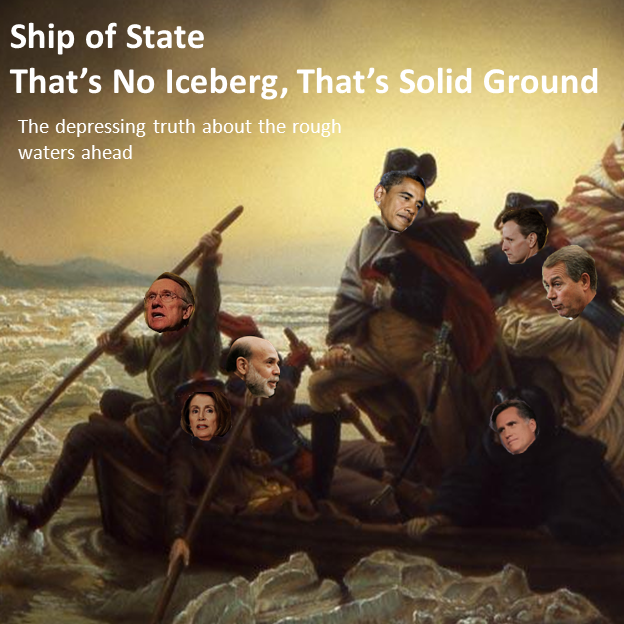
By RAR
There
is a war being waged among economists over whether or not it
is wise to stimulate - some would say, "prop up" - the U.S.
economy using borrowed money.
Rather than let the
marketplace find its own level, as current front-runner for
the GOP nomination Mitt Romney is suggesting should have
been done, the Bush and Obama
administrations have green-lighted the Federal Treasury to
create money in the form of Treasury Bonds, which the U.S.
government has sold broadly, and some of which it has
purchased from itself using funds borrowed from China and
Japan. Funds have been doled out to financial institutions
at zero percent interest, and most famously to auto makers
(General Motors), to create
stability within key companies. This is what
Republicans refer to as "picking winners", while Democrats
argue that it has saved the U.S. from another 1930s-style
Depression, and therefore is one of President Obama's
crowning 1st-term achievements.
The administration's policy
has been to keep money available at low interest rates as a
hedge against a double-dip recession taking place as the
result of
economic deflation. Fed Chairman
Ben Bernanke and
Obama Economic Advisor Tim Geithner have championed this
approach, which economists such as Paul Krugman has
suggested has been too small. Krugman suggests that the Fed pump $8-10 trillion dollars more
into the economy just to achieve "quantitative easing".
Otherwise put, to keep the whole economy from collapsing
more quickly.
Others aren't so sure that is
wise. In fact,
they doubt the stimulus and the bailouts were ever a good
idea in the first place.
We should all know pretty soon
about whether or not they were right.
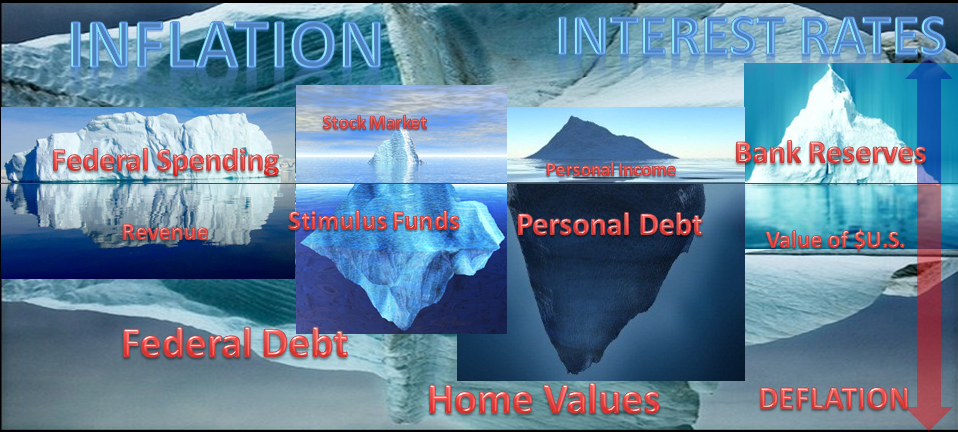
BUBBLE
ECONOMY: The U.S. economy could rightly be perceived to be a "bubble
economy" even - in fact, especially - in the best of times. A full
70 percent of the total value of the U.S. economy is dependent upon consumer
spending. That is really at the heart of the economic catastrophe that is upon
us: through successful promotions, we have sold much of the world on a
philosophy of capitalism that is reliant on creating bubble economies that we
can somehow then keep aloft.
What goes up, must come down, as the axiom
goes, which is a fact of physics that, applied to economics,
appropriately ties gravity to each individual's capacity to overcome
economic burden.
It is obviously futile to try to make something behave in ways that it
is not naturally equipped, or sufficiently resourced to do, but in our capitalistic model we have had answers for
such
challenges. The stress there should be on have had.
In the past, the U.S. has devoted
significant resources to education, which is the only way to equip
anyone with the skills and intellectual capital required to compete in the sort
of competitive societies created by free market capitalism.
Education fueled the boom years of the
post-WWII U.S. economy, when manufacturing jobs were plentiful and there
was a burgeoning management class, a layering of professional levels
with all the associated income achievement.
That clicked along really well in the U.S.
until around 1970, which happens to coincide with the Nixon
Administration's (1971) decision to end the direct convertibility of the
dollar to gold, essentially taking the U.S. off the Gold Standard. Since
the Bretton Woods Agreements after WWII, the U.S. had fixed the price of
gold at approximately $35 per ounce and many countries had fixed their
exchange rates to the U.S. dollar. In that sense, those countries'
currencies, pegged to the dollar, were recognized as having
fixed gold-based value. That ended with the "Nixon Shock" of '71.
CLASS WARFARE:
Moving off the Gold Standard had the effect of converting all monetary
values from tangible assets to bookkeeping entries. This created
the opportunity for some extraordinary things to happen, all of which
revolved around usury, or the concept of making money on the interest
payments of money one loans to others.
The entire modern-day concept of credit, in
the form of credit cards, was still a recent development in 1971: the
first credit cards in general circulation had only started to appear a
scant 10 years earlier. Americans, and particularly those who
experienced the Depression Era of the 1930s, were extremely reluctant to
buy anything on credit. It carried a stigma associated with struggling
folk who couldn't make their way in the world, virtually relying on the
kindness of others.
That old world thinking quickly began to
wear off as after 1970 it became more and more difficult for Americans
to avoid using credit, because the actual purchasing power of
working class incomes essentially froze in that period and have stayed
frozen ever since.
Here we return to the iceberg economy, for
since 1970 incomes have been further burdened by payments on credit
debt, lurking below the surface of individual home finances and dragging
savings and cash purchases down.
Benefiting from this change in the U.S.
economy were the credit card companies, who distributed the cards and
administrated the associated accounts, and the banks who issued the
credit. What you essentially had was a massive transfer of wealth from
the middle class, who were the principal users of credit cards, and to
the finance industry, whose profits boomed on the income from revolving
credit, which for them was like getting paid over and over again on the
same sale.
There was another consequence of these big
changes in America's way of doing business: finance industry
professionals figured out that there was an investment class out there
who had no way of knowing how to invest their newly found riches, but
had plenty of cash flow to play around with.
At that point, ethics became a
principal dynamic, and there we got a canary in the coal mine in the
form of Richard Nixon and his Watergate activities, which brought down
his presidency and rocked America's sense of itself. Who had we become?
In truth, we had very quickly become a
people who would churn investments for the benefit of service fees
rather than investor well being, loan money at exorbitant rates to a
nation increasingly reliant on credit to pay for basic needs (food,
utilities, gas, housing), and finance lifestyles that working class
people could only afford by borrowing money they would hope to
eventually pay back.
A final Nixon irony was that it was he who
opened up U.S. relations with China, a diplomatic breakthrough that
would ultimately drain the U.S. of its manufacturing base and crush the
nation under foreign debt. That meant that many of those downwardly
mobile working class folks carrying the big credit debt were in big
trouble.
Here we have the bubble within the big
bubble.
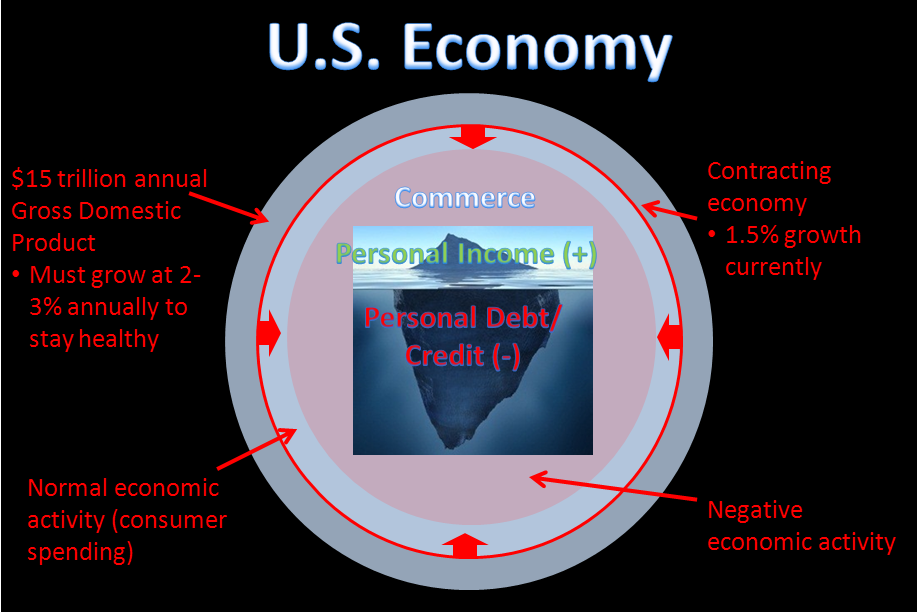
Underlying debt is contracting market
activity and undermining the foundation of the overall U.S. economy.
This is a pattern being reproduced in free market economies around the
world, many of which have been hoping to keep the whole thing afloat by
pumping borrowed money into the system.
But exactly why, and to what effect, is something
that is
less than a scientifically-determined plan and strategy. In fact, the
science is all on the side of the real forces in the economy and not on
the wild promises of pie-eyed free market capitalists, Republican and
Democrat alike.
By promoting this notion that somehow if we
just believe in ourselves that our mostly submerged economy will bob
right back up to achieve economic stability, those dream spinners are ignoring the very
real forces at play.
FEDERAL SPENDING VS
TAX REVENUES: At a time when more-and-more Americans are
requiring public assistance than at any time in years, the debate in
Washington D.C. is all about how much to shrink the size of government.
The argument focuses around the $3.7 trillion dollars the federal
government spends each year versus the $2.1 trillion dollars it takes in tax
revenue, a difference that is made up through loans, primarily from foreign
investors.
America's shrinking tax revenues are, of
course, tied to contracting U.S. incomes and employment opportunities,
the latter of which has been exacerbated by the out-sourcing of U.S.
jobs to cheap labor markets, primarily in Asia.
The Republican response is to shrink
government back to the size of its tax revenues, and lower those to make
it even smaller. They envision pushing federal assistance programs back
down to the state level, where they would be killed altogether because
state governments are equally strapped for cash, if not in worse shape,
and in no position to provide additional services.
The Democratic response is to expand tax
revenues to pay for current levels of service. Their target is high
income earners and corporations, and here is where the "Class Warfare"
argument comes into play.
The richest Americans derive most of their
annual income from capital gains on investments, which has yielded the
"Buffet dichotomy" wherein people living on investment income are paying
only 15 percent income tax while working people are paying around twice
that percentage in taxes on far lower income from wages.
The other big window of tax revenue losses
for the federal government is that left wide open for tax loopholes and
offshore accounting practices. On average, U.S. corporations are paying
only 12 percent of their revenues in federal taxes, though the corporate
tax rate in the U.S. is set at 35 percent.
Here again, with corporate revenues shielded
from taxes, we have another channel for moving money away from
government support and into the coffers of corporate owners and
investors, including the plethora of S-type corporations that allows the
directors of major privately held companies (e.g., Bechtel) to claim
corporate income as personal, with the range of tax advantages such filings afford.
STOCK MARKET
DISCONNECT: Many Americans and news correspondents point to
the recovery of Wall Street, as characterized by the NYSE and NASDAQ
exchanges, as proof that the economy is rebounding.
In fact, the DOW dipped to around 7,500 in
2008 and has now rebounded to over 13,000, which sounds like boom times,
right?
This is a completely illusory figure, and
one that no longer sheds much light on the well being of the U.S.
economy beyond the incomes o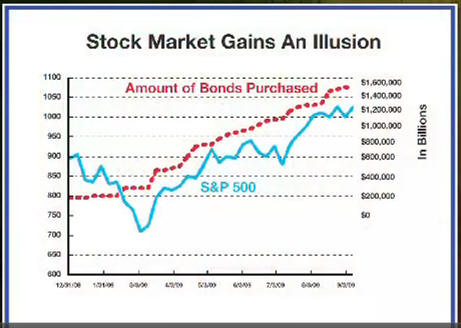 f
the people who work in the big investment firms, who are doing quite
well. The market itself is yet
another balloon inflated with
borrowed money, it's size almost exactly paralleling the amount of
borrowed stimulus money that has inflated these numbers, per the chart
below. f
the people who work in the big investment firms, who are doing quite
well. The market itself is yet
another balloon inflated with
borrowed money, it's size almost exactly paralleling the amount of
borrowed stimulus money that has inflated these numbers, per the chart
below.
As this chart seems to imply, the Standard &
Poor 500 index has roughly the same relationship with Treasury bond
issuances as your worthless cousin Ernie has with the trust fund left to
him by his wealthy grandmother. This financial profile doesn't actually
mean Ernie is worth a damn personally, though he probably can realize
some nice profits by loaning his unearned income at lucrative rates.
Part of the problem with watching the stock
market is that it creates false impressions about the actual well-being
of the economy.
BANK AND CORPORATE
RESERVES: The fly in the ointment for those who would use a
"class warfare" argument to defend against tax increases on high income
earners is that bankers and corporate leaders are taking from the
government, in stimulus funds and tax breaks, and building up huge cash
reserves that they are using only to consolidate power and economic
security.
The financial institutions were incented by
the Bush and Obama administrations to ease restrictions on credit,
particularly on the sort of daily overnight transactions that allow
businesses to remain in operation from one business day to the next without
being constricted by cash flow issues. Amazingly, the banks have held on
to the money, realizing huge interest benefits and stabilizing overnight
credit markets while doing little to develop loans for small businesses
for the purpose of job generation, which was the intended purpose of the
incentives.
That is partly understandable, because jobs
are created only when additional workers are needed to meet market
demands, and since 2008 there has been little to no market demand of any
kind. The economy has contracted.
Along the same lines, corporations are
realizing historic profits but banking cash reserves, rather than make
new investments in personnel and equipment.
Here again, we have a massive transfer of
wealth from the public into the accounts of a very few super wealthy
corporations, and their ultra-wealthy owners, directors and principal
shareholders. "Class warfare", in this instance, is the disinclination
to create paying jobs that would re-circulate or share the accumulated
wealth: wealth that continues to grow as these loaded corporations
exploit a cash-strapped world that is growing more and more dependent
upon credit, and consolidate power through the purchase of competing
interests.
DEPRESSION IN 2013:
That all of these things have and are happening, and that the U.S.
government and an engaged electorate cannot recognize or stop any of it,
is the principal conundrum of our times. And it is one that is going to
be solved for us rather soon.
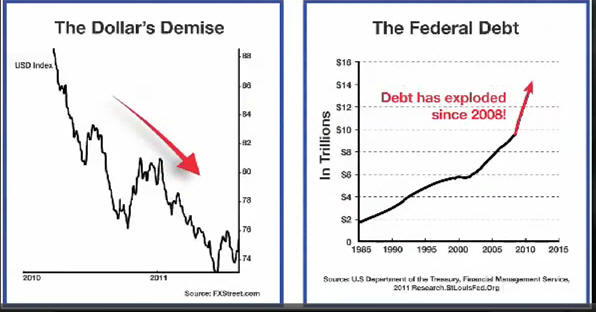
As depicted in the charts above, the value
of the $US has been on a precipitous decline while the amount of U.S.
debt (now amounting to over $57K per each U.S. citizen) has
skyrocketed. This has been particularly true since the 2008 realization
that the economy was on the verge of total collapse. The supply siders
of the Bush and Obama administrations chose to feed the top income
earners, through bailouts and subsidies, and through the sale of
Treasury Bonds, all for the purpose of stabilization.
Obama didn't fix anything, he just
borrowed money to hold the status quo in place for awhile longer, until
solutions could be discovered.
Obama, Bernanke and Geithner have been
fighting off a double-dip recession, and doing so by keeping Fed money
cheap, interest rates on Fed money unsustainably low, and thereby making
certain that all this stimulus money doesn't create an inflationary
spiral.
That genie cannot be held in that bottle
forever, and we are seeing interest rates creep up little by little.
But here is the rub: they are about to go up
a lot higher, with the likely result being not inflation, but the
much-dreaded deflation, i.e., a further contraction of the
economy.
Why will this happen? Because all of those
Treasury Bills that are issued by the government represent short-term
debt, meaning they come due after 12 months or so after which point they
are turned in for face value. The government, of course, has not become
significantly wealthier in the course of these short-term loans, so
additional money must be borrowed to cover the payout on these matured
T-Bills. It is a similar story with longer turn Treasury Bonds, which
yield semi-annual interest payments, and create further pressure on the
government to borrow more money to meet these obligations. This is the
sort of pyramid scheme that has lowered the U.S. credit rating from AAA
status.
A tremendous amount of this debt has been
issued and the maturity of these Treasury loans is going to
happen as a landslide of economic burden that is going to push U.S.
interest owed to foreign investors to rates as high as 25 percent, or so
predict some gloomsayers. Finally, the U.S. government will become like a family household that can't make principal
payments to lower overall debt, but can only make payments on interest.
That will result in crushing pullbacks of
funding for federally supported programs, and likely result in a spike
in unemployment and a low-level form of "hyper-inflation". Some
predict that inflation will be about 100 percent per year for three years,
beginning in 2013.
Barring some radical change in policy at the
Federal Government level - which is not going to happen in a
presidential election year - we will see a dramatic economic collapse in
2013, likely lasting through 2016. This is the prediction of some
economists who look at the overall fundamentals of the U.S. economy and
don't see any way that it can avoid this sorry scenario.
SO WHAT CAN WE DO?
STAY TUNED FOR THE NEXT
INSTALLMENT:
Taking Stock of a New
World Reality
(Edited 20812)
|